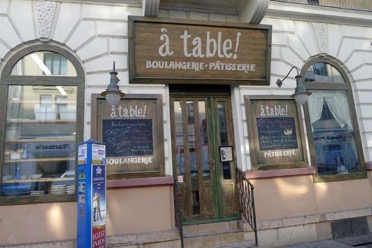Hunglish

"I feel like a temporary illusion here."
Walk down any street in Europe and your eye will catch some familiar words displayed on shop fronts. Typically between two words clearly in the local language, a prominent English word appears. Much in the way that a French word in an English advertisement catches the eye and imparts a certain cache even when I don't understand the meaning of the word, I suppose English in a French or Hungarian business name sets that shop apart, perhaps a smidge above, its competitors. Some of the words seem necessary. I mean what besides Burger Bar would one name a burger bar in Budapest? Pizza's pizza the world 'round. The Chinese fast food joint in our Obuda neighborhood declares CHINESEFASTFOOD beside a Hungarian phrase I suspect translates into CHINESEFASTFOOD, so why the concatenated English version? It seems that all Chinese, Vietnamese, and Thai places in Budapest prominently feature English on their signs. Are these places there to serve English-speaking visitors, or does this encoding hold special meaning for the locals, too? ©2019 by David A. Schmaltz - all rights reserved
Menus rarely feature even a hint of English. One waiter might begrudgingly disclose English skills, though he might withhold them as if it might poison him to resort to speaking the language. NuthinSpecial people like me can't even remember a proper greeting in the local tongue, so I just blurt in the only language I know, figuring that I can always resort to the good old point and click if my verbal introduction fails. At our favorite neighborhood place, the waiter knows full well that I'm a Hungarian ignoramus, and he wastes no time letting me know that he's not impressed. The food's really terrific, but I have to play twenty questions with this reluctant server to affect anything like an order. He points to menu entries as if I might understand by just focusing my attention on an item. It all looks like undifferentiated consonants to me.
Most every vowel here features a macron or an umlaut, punctuation that I interpret to mean "treat this vowel as if it were a consonant." Most words feature no unadorned vowels, so even when I attempt at a pronunciation, I bungle it, eliciting a sorry shake of the waiter's head. The presence of Hunglish in a sign does not guarantee that an English speaker resides within. Shopping at the farmer's market, I rely upon hand signals, but something tells me that an affirmative shake of the head means something different here. If I hold up my index finger, it means "two," because they use the thumb to denote "one." The Muse remembers better than I, giving a confident thumb up when I would inadvertently order two with my index finger.
I mostly remain mute. I nod and blink, hoping to communicate non-verbally. I understand what a piss-poor representative I make, all bumbles and mumbles, mostly just making do without ordering anything. A week into our excursion, some meals just seem too taxing to even attempt. I consider the gauntlet before me and figure that I could stand to miss a meal or two. I am tasked as an observer here, not a commentator or a translator. I basically witness without attempting any two-way exchange, an observant ghost of a presence only occasionally fading into focus with a fundamentally untranslatable English phrase. The swing band musicians appreciated me when I told them I thought they were all smart asses, a term that in the jazz world easily translates into every language. In shops, the sales clerks present me with a paper bill, which I can usually translate into bills and coins, though the unfamiliar coins struggle to add up right. The helpful clerk takes the mess and makes the change without comment. What language would any comment have to take to make equal sense to us both? The sign outside might proclaim Supermarket, but it's clearly a markt inside.
Every two year old in our neighborhood rides a little wheeled critter vehicle. Mom's pushing little sister in a proper perambulator, while big brother walks himself alongside spouting perfect Hungarian kidspeak. The tone and phrasing seems exactly like what an English-speaking two year old might affect, though the words come out indecipherable to my ear. I figure that with a couple of years' emersion, I might master a two year old's fluency, but little more. The Burger Bar signs serve as warning enough to nudge me toward a cafe with a sign I cannot read. I seek authenticity, though my very presence, like the prominent presence of an English word on a Hungarian sign, suggests that authenticity might have been modified inside. My very presence produces a modified version of everything here. I cannot be present without somehow shifting the gravity around me, which affects not just what I see but also what others see of me. I feel like a temporary illusion here.


